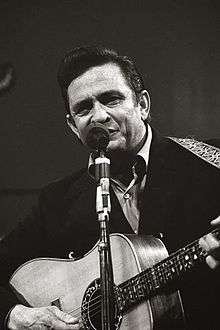
"Folsom Prison Blues" is a song by American singer-songwriter Johnny Cash. Written in 1953, it was first recorded and released as a single in 1955, and later included on his debut studio album Johnny Cash with His Hot and Blue Guitar! (1957), as the album's eleventh track. Borrowing liberally from Gordon Jenkins' 1953 song, "Crescent City Blues", the song combines elements from two popular folk styles, the train song and the prison song, both of which Cash continued to use for the rest of his career. It was one of Cash's signature songs. Additionally, this recording was included on the compilation album All Aboard the Blue Train (1962). In June 2014, Rolling Stone ranked it No. 51 on its list of the 100 greatest country songs of all time.
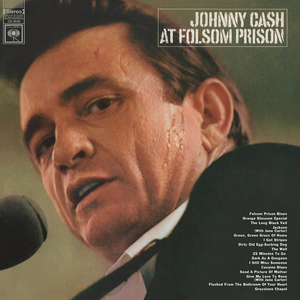
Johnny Cash at Folsom Prison is the first live album by American singer-songwriter Johnny Cash, released on Columbia Records on May 6, 1968. After his 1955 song "Folsom Prison Blues", Cash had been interested in recording a performance at a prison. His idea was put on hold until 1967, when personnel changes at Columbia Records put Bob Johnston in charge of producing Cash's material. Cash had recently controlled his drug abuse problems, and was looking to turn his career around after several years of limited commercial success. Backed by June Carter, Carl Perkins, and the Tennessee Three, Cash performed two shows at Folsom State Prison in California on January 13, 1968. The initial release of the album consists of fifteen songs from the first show and two from the second.
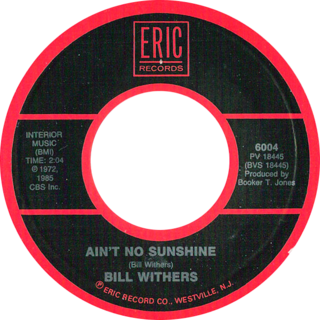
"Ain't No Sunshine" is a song by Bill Withers, from his 1971 debut album Just As I Am, produced by Booker T. Jones. The record featured musicians Donald "Duck" Dunn on bass guitar, Al Jackson Jr. on drums and Stephen Stills on guitar. String arrangements were done by Booker T. Jones. The song was recorded in Los Angeles, with overdubs in Memphis by engineer Terry Manning.

"The Devil Went Down to Georgia" is a song written and recorded by American music group Charlie Daniels Band and released on their 1979 album Million Mile Reflections.
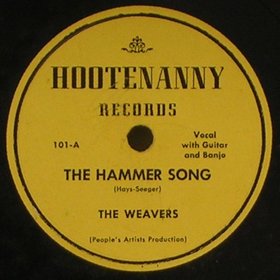
"If I Had a Hammer " is a protest song written by Pete Seeger and Lee Hays. It was written in 1949 in support of the Progressive movement, and was first recorded by the Weavers, a folk music quartet composed of Seeger, Hays, Ronnie Gilbert, and Fred Hellerman. It was a #10 hit for Peter, Paul and Mary in 1962 and then went to #3 a year later when recorded by Trini Lopez in 1963.

"Garden Party" is a 1972 song written by Rick Nelson and recorded by him and the Stone Canyon Band for the album Garden Party. The song tells the story of Nelson being booed at a concert at Madison Square Garden. It was Nelson's last top 40 hit, reaching No. 6 on the U.S. Billboard pop chart.

"Sugar, Sugar" is a song written by Jeff Barry and Andy Kim, produced by Barry and recorded by The Archies, a fictional bubblegum pop band from Archie Comics. It was released as the group's third single on the Calendar Records label on May 24, 1969, rereleased on the Kirshner Records label in July 1969, and included on their second album, Everything's Archie. In the autumn of 1969, it topped both Billboard's Hot 100 and the UK Singles Chart, ranking number one for the year in both America and the UK. It is the most successful bubblegum pop single of all time, and is widely regarded as the apotheosis of the late-1960s/early-1970s bubblegum music genre. In mid-1970, R&B/soul singer Wilson Pickett achieved success on both the US soul and pop charts with a cover version.

"All I Really Want to Do" is a song written by Bob Dylan and featured on his Tom Wilson-produced 1964 album, Another Side of Bob Dylan. It is arguably one of the most popular songs that Dylan wrote in the period immediately after he abandoned topical songwriting. Within a year of its release on Another Side of Bob Dylan, it had also become one of Dylan's most familiar songs to pop and rock audiences, due to hit cover versions by Cher and the Byrds.
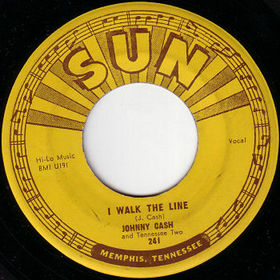
"I Walk the Line" is a song written and recorded in 1956 by Johnny Cash. After three attempts with moderate chart ratings, it became Cash's first #1 hit on the Billboard charts, eventually reaching #17 on the US pop charts.

"Jackson" is a song written in 1963 by Billy Edd Wheeler and Jerry Leiber. It was recorded in 1963 by the Kingston Trio, Wheeler, and Flatt and Scruggs. It achieved its most notable popularity with two 1967 releases: a country hit single by Johnny Cash and June Carter, which reached No. 2 on the Billboard Country Singles chart, and a pop hit single by Nancy Sinatra and Lee Hazlewood, which reached No. 14 on the Billboard Hot 100 and No. 39 on Easy Listening.

"Border Song" is a song by Elton John with music by John and lyrics by Bernie Taupin. The song initially appeared on the 1970 album Elton John, and was released in the spring of 1970 as the LP's first single. After failing to chart in the UK, it was released in North America a few months later. It met with more success there, especially in Canada, where it peaked at No. 34. The appearance of "Border Song" on the Canadian charts was John's first chart appearance in any country.

Orange Blossom Special is the 21st album released by musician Johnny Cash on Columbia Records in 1965. The recordings include country and folk standards, such as "The Long Black Veil", "When It's Springtime in Alaska", "Danny Boy" and "Wildwood Flower".

"Jolene" is a song written and recorded by American country music artist Dolly Parton. It was produced by Bob Ferguson and recorded at RCA Studio B in Nashville, Tennessee on May 22, 1973, then released on October 15, 1973 by RCA Victor as the first single and title track from her album of the same name.

"Children's Story" is a song recorded by British-American hip hop artist Slick Rick. Taken as the second single from his album The Great Adventures of Slick Rick, the song was a Top 5 hit on both the Hot R&B Singles and the Hot Rap Tracks charts. It is one of the most sampled rap songs of all time.
"Love Letters in the Sand" is a popular song first published in 1931.

"Da Doo Ron Ron (When He Walked Me Home)" is a song written by Jeff Barry, Ellie Greenwich and Phil Spector. It first became a popular top five hit single for the American girl group the Crystals in 1963. American teen idol Shaun Cassidy recorded the song in 1977 and his version hit number one on the Billboard Hot 100 chart. There have also been many other cover versions of this song, including one by the songwriters Jeff Barry and Ellie Greenwich themselves, performing as the Raindrops.

"I'll Feel a Whole Lot Better" is a song by the Los Angeles folk rock band the Byrds, first released in June 1965 on the B-side of the band's second single, "All I Really Want to Do". Despite initially being released as a B-side, the song managed to chart in its own right in the U.S., just outside the Billboard Hot 100. It was also included on the Byrds' debut album, Mr. Tambourine Man.

"Can't You See" is a song written by Toy Caldwell of The Marshall Tucker Band. The song was originally recorded by the band on their 1973 debut album, The Marshall Tucker Band, and released as the album's first single. Record World called it "a strong rhythm item that continually builds and builds." A live version was released in 1977 and peaked at number 75 on the Billboard Hot 100. Cover versions of "Can't You See" have charted for Waylon Jennings and the Zac Brown Band with Kid Rock (2010).

"What Is Truth" is a song written and recorded by American country singer-songwriter Johnny Cash released in February 1970.
"Born and Raised in Black and White" is a song written by Don Cook and John Barlow Jarvis, and originally recorded by The Highwaymen on their 1990 album Highwaymen 2. Mark Collie covered it for his 1991 album Born and Raised in Black & White, and Brooks & Dunn on their 1998 album If You See Her.
